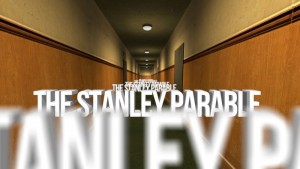This is The Stanley Parable. It is a game without combat, high scores, or a way to “win”. It is a game that creates questions without ever offering much in the way of answers.
Designed by Davery Wreden [of Galactic Cafe], The Stanley Parable is a First Person Exploration game in which players take on the role of Stanley, whose job it is to sit in his office and press whatever button his computer tells him to. One day Stanley finds that his computer has stopped giving him commands and, at a loss as to what he should do, wanders throughout the company building to find that all of his coworkers have mysteriously vanished.
Stanley’s adventure is narrated and shaped by a voice who describes his actions and choices, as well as occasionally stating what Stanley ought to do next, although the player maintains the freedom to follow along or ignore the narrators directions. The game is quite short and quickly becomes a loop that allows players to experiment with different choices and branching paths, exploring the cause and effect relationship between Stanley, the narrator, and the environments around them.
The game was originally released by Davey, then only 22 years old, as a modification for Half-Life 2, after receiving inspiration from his many musings on the way narratives in AAA games both succeeded and failed at directing players through highly controlled and scripted narratives, as well as the juxtaposition revealed between a player with freedom of action versus a narrative with a set beginning, middle, and end [link].

Recognizing that video games allowed players, or the audience, to interact with stories in ways that is unique from other mediums, Davey set forth to explore how such power in the hands of the audience can change a structured story. In short, if one were to define a video game as an “experience with rule sets,” Davey wanted to make a game with the explicit purpose of allowing players to follow, break, or bend the rules as they see fit, as well as to push players to consider the implications, or lack thereof, of their choices within the game [link].

Originally meant as nothing more than a resume builder, The Stanley Parable mod was downloaded over 64,000 times in the first week of its release and received praise from critics throughout the industry [link]. Davey went on to expand upon the game, fully recreating it as a full product with more content and several new endings for players to explore. A year after its first release, Davey announced that the game had sold over a million copies.
I love this game because of the way it challenges our perceptions of stories, the way we play and consume video games, as well as pushing the boundaries of what a “video game” can be. The Stanley Parable reveled in constantly subverting the players expectations. In so many ways, it’s a game where you follow the rabbit down the rabbit hole, only to find there is no definitive bottom. When a player follows the “intended” story, they are led through a series of events that reveal Stanley and his coworkers were under some form of mind control that forced them to be happy with constantly doing what they were told. Stanley ultimately shuts down the machine that enabled this and is led to a hanger door that opens and reveals a beautiful country scenery, where Stanley can finally be free.

The many other paths that players can lead Stanley down, however, culminate in significantly different endings; some in which the narrator kills Stanley for ruining his “story,” others in which the Narrator is shown to be just as much a character in this tale as Stanley is, and still others in which the player bears witness to a fictional character struggling with the notion that it may not be “real”. In all forms of art, it is inevitable that a sharp line be created, however thin it may be, between the audience interpretation and the creator’s intention. In a medium founded on the concept of interactivity, video games have pushed up against and blurred the line between the story of the creator and the story of the player for years. While many have considered this to be an insurmountable problem that prevents video games from being considered “art,” The Stanley Parable focuses almost entirely on this conflict and manages to build an experience around it that is not only wholly unique, but also profound in its meaning and the themes it conveys.


Leave a Reply